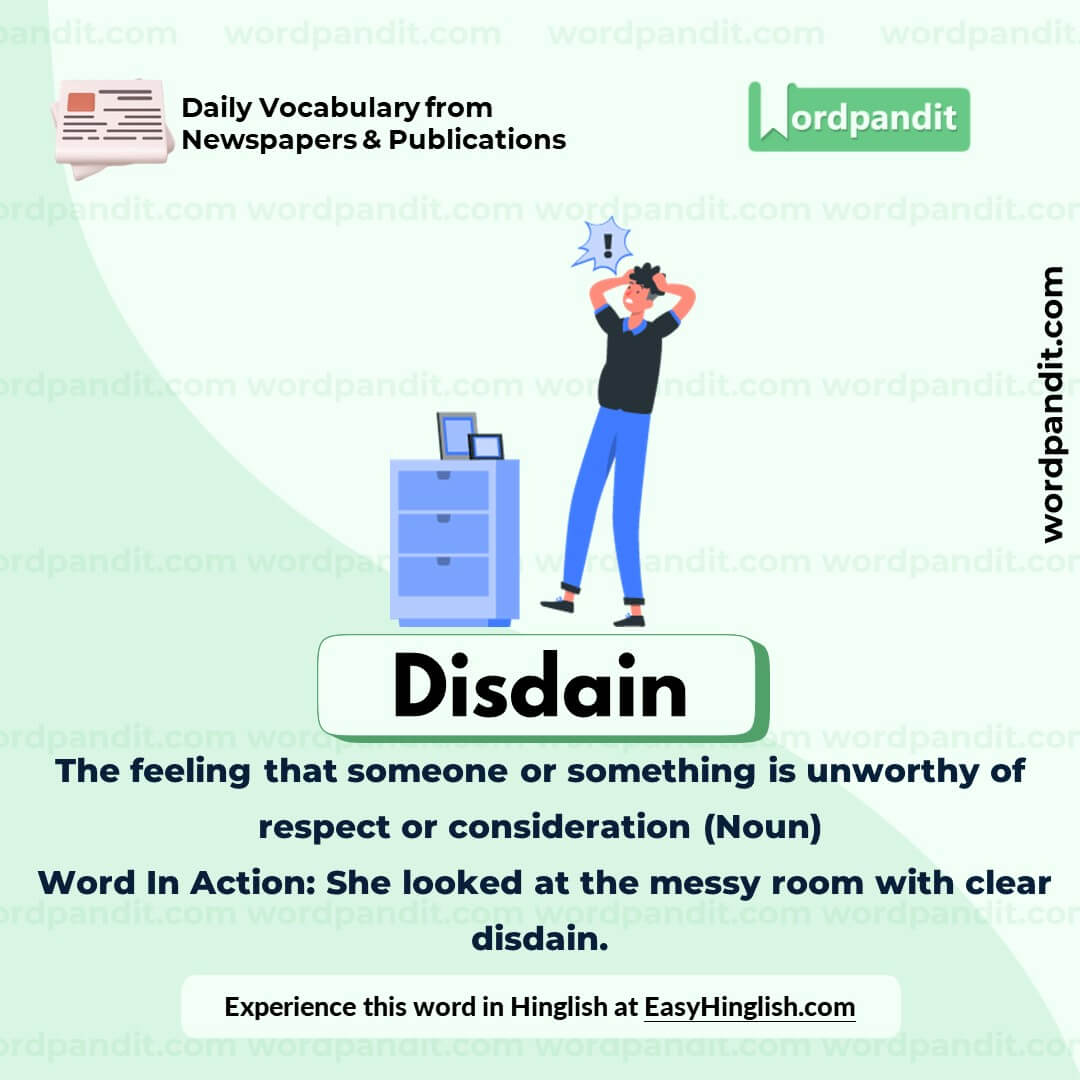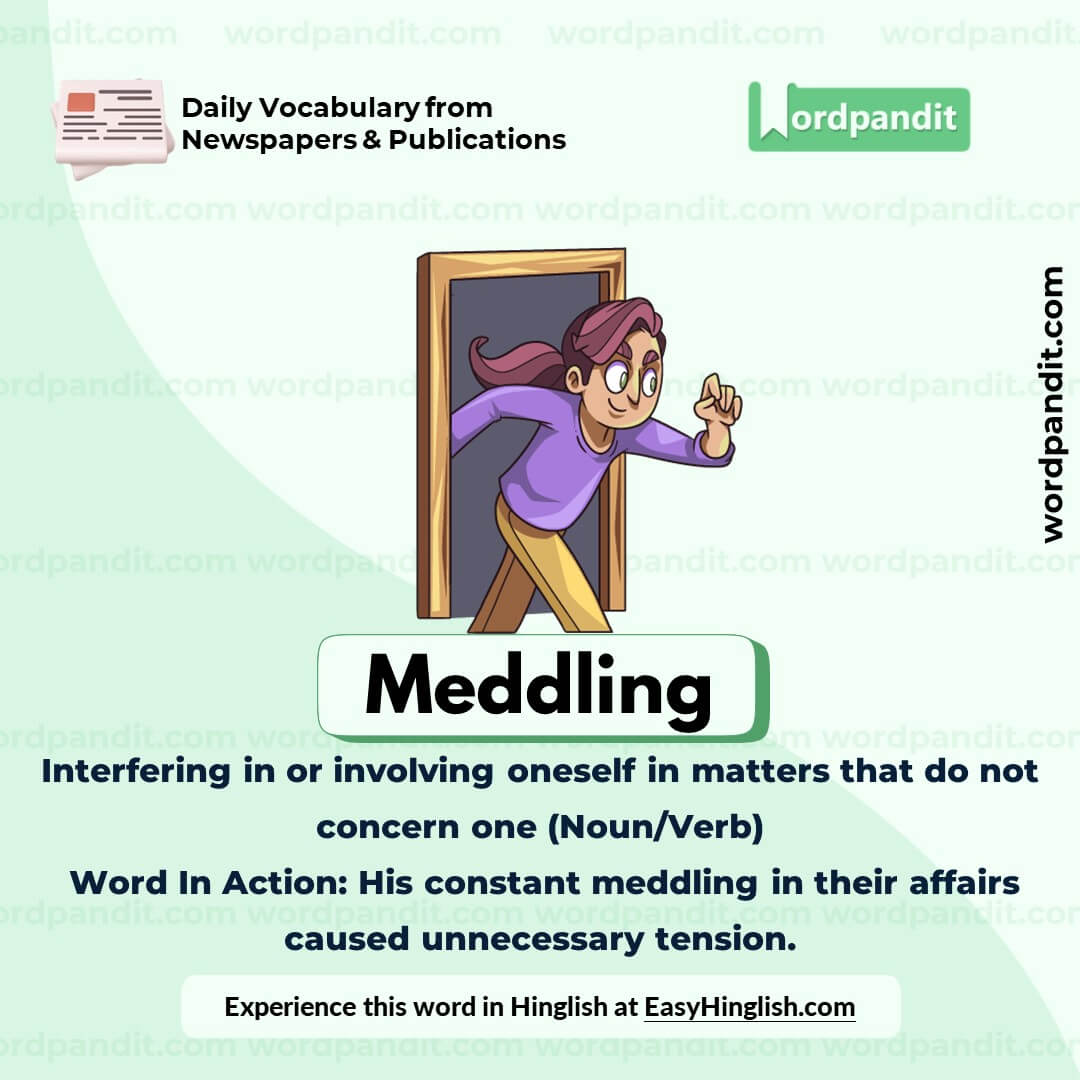Daily Vocabulary from Indian Newspapers and Publications
Welcome to Wordpandit’s Indian Vocabulary Hub
At Wordpandit, we understand the importance of staying rooted in the local context while expanding your language skills. This section focuses on enriching your vocabulary with words and phrases drawn from India’s leading newspapers and publications, ensuring you're learning vocabulary that is practical, relevant, and uniquely Indian.
Why Indian Sources Matter
We believe that the best way to master any language is by immersing yourself in local content. That’s why we carefully curate vocabulary from top Indian publications, including:
- The Hindu
- The Times of India
- The Economic Times
- Hindustan Times
- Live Mint
- The Indian Express
- And many others...
Stay Updated, Stay Relevant
With daily updates from Indian news sources, you’ll be consistently learning words that reflect the trends and shifts in Indian society and culture. Our focus is to provide vocabulary that enhances your understanding of the language in an Indian context.
How Wordpandit Supports Your Goals
Whether you’re preparing for exams, aiming to improve your professional communication, or simply want to stay connected with the latest Indian vocabulary, Wordpandit is here to guide you every step of the way.
Learn with a Practical Approach
Our interactive learning methodology includes real-world examples, engaging activities, and context-specific usage to ensure that every word becomes part of your active vocabulary.
Dive into Indian Vocabulary Today!
Why Choose Wordpandit?
Practical Learning: Focus on words you'll actually encounter in real-world reading, enhancing your comprehension and communication skills.
Diverse Content: From current affairs to scientific breakthroughs, our varied sources expose you to vocabulary across multiple domains.
Effortless Integration: Make Wordpandit a part of your daily routine. Just a few minutes each day can significantly boost your lexicon over time.
Your Path to Vocabulary Mastery
- Visit our Daily Vocabulary section regularly
- Explore new words and their usage in context
- Practice incorporating these words into your own writing and speech
- Track your progress as your vocabulary expands
Start Your Journey Today
Embark on your vocabulary enhancement journey with Wordpandit. By consistently engaging with our daily posts, you'll build a robust vocabulary that serves you well in academic, professional, and personal contexts.
Remember, a word a day keeps linguistic limitations at bay. Make Wordpandit your daily companion in the quest for vocabulary excellence!
WORD-1: Invocation
Context:
"Suggested that utterances of Ambedkar’s name constituted a futile exercise and in contrast the invocation of the name of god would pave the way for heaven." - The Wire
Explanatory Paragraph:
The word "invocation" refers to the act of calling upon someone or something, especially a higher power, for help, inspiration, or as a form of respect. It often appears in religious or ceremonial contexts where a deity or spiritual figure is addressed. In a broader sense, it can also mean an appeal or reference to an authority or principle.
Meaning: The act of invoking or calling upon someone, especially a deity or authority, for aid, guidance, or inspiration. (Noun)
Pronunciation: in-voh-KAY-shun
Difficulty Level: ⭐⭐⭐ Intermediate
Etymology: Originates from the Latin word "invocatio," meaning "to call upon or appeal."
Synonyms & Antonyms:
Synonyms: Appeal, prayer, request, petition, supplication
Antonyms: Rejection, renunciation, disregard
Usage Examples:
- The priest began the ceremony with an invocation to the goddess of wisdom.
- Her speech was an invocation of justice, calling for equality and fairness.
- The invocation of historical examples strengthened his argument.
- During the meeting, the leader's invocation of team spirit inspired everyone to work harder.
Cultural Reference:
"Invocation is a key part of many religious ceremonies, such as the invocation of the Holy Spirit during Christian prayers or the chanting of mantras in Hinduism." - General Knowledge
Think About It:
Why do you think invocation is such a powerful tool in both religious and secular contexts?
Quick Activity:
Write down a short invocation addressing a quality you admire, like wisdom or courage, and reflect on how it inspires you.
Memory Tip:
Remember "invocation" by associating it with "inviting" (calling upon) a higher power for help or guidance.
Real-World Application:
"Invocation" is widely used in public speeches, legal documents, and creative writing to emphasize appeals to authority, inspiration, or moral principles.
WORD-2: Disdain
Context:
"Those outrageous utterances of Shah unabashedly displayed intense contempt and disdain for Ambedkar with haughtiness which does not behove of a minister." - The Wire
Explanatory Paragraph:
The word "disdain" refers to a feeling of contempt or lack of respect for someone or something perceived as inferior or unworthy. It is often accompanied by an attitude of superiority or arrogance. Disdain can be expressed through words, actions, or even body language, and it carries a strong negative connotation.
Meaning: The feeling that someone or something is unworthy of respect or consideration. (Noun)
Pronunciation: dis-DAYN
Difficulty Level: ⭐⭐ Beginner to Intermediate
Etymology: Derived from the Old French word "desdeign," and the Latin "dedignari," meaning "to regard as unworthy."
Synonyms & Antonyms:
Synonyms: Contempt, scorn, derision, disrespect
Antonyms: Respect, admiration, esteem, regard
Usage Examples:
- She looked at his messy desk with obvious disdain, shaking her head in disapproval.
- The professor’s disdain for plagiarism was evident in her strict policies.
- His disdain for modern art was apparent in his dismissive comments during the gallery tour.
- With disdain in her voice, she rejected the proposal as beneath her standards.
Cultural Reference:
"The character of Mr. Darcy in Jane Austen's 'Pride and Prejudice' initially displays disdain for Elizabeth Bennet, a sentiment he later overcomes." - Literary Reference
Think About It:
Why do people often feel disdain for things they do not understand or appreciate?
Quick Activity:
Write down three things you have felt disdain for in the past. Reflect on whether that disdain was justified or based on misconceptions.
Memory Tip:
Connect "disdain" with "dismissive" to recall its meaning as a feeling of scorn or lack of respect.
Real-World Application:
"Disdain" is often used in social commentary, literature, and interpersonal relationships to describe attitudes of superiority or disrespect, especially in debates and critiques.
WORD-3: Meddling
Context:
"Former Untouchable had no business meddling in matters normally the preserve of the Brahmin." - The Wire
Explanatory Paragraph:
The word "meddling" refers to interfering in something that is not one's concern, often in a way that is intrusive or unwelcome. It implies unwarranted involvement in matters where one has no authority or need to be involved, often leading to conflict or complications.
Meaning: Interfering in or involving oneself in matters that do not concern one. (Noun/Verb)
Pronunciation: MED-ling
Difficulty Level: ⭐⭐ Beginner to Intermediate
Etymology: Originates from the Old English "meddlen," derived from the Old French "mesler," meaning "to mix" or "to mingle."
Synonyms & Antonyms:
Synonyms: Interference, intrusion, tampering, prying
Antonyms: Assistance, detachment, disinterest, indifference
Usage Examples:
- The neighbors accused her of meddling in their family affairs by offering unsolicited advice.
- His meddling in the office workflow disrupted the smooth operation of the project.
- Parents sometimes struggle to balance guidance with meddling in their children’s lives.
- She was tired of his constant meddling in decisions that did not concern him.
Cultural Reference:
"In Shakespeare’s 'Hamlet,' Polonius is often seen as meddling in affairs that lead to his downfall, particularly his intrusion into Hamlet’s relationships." - Literary Insight
Think About It:
Why do you think people tend to meddle in issues that do not concern them, and how does society view such behavior?
Quick Activity:
Think of a time when someone meddled in your business. How did it make you feel? Write a brief note on how you handled it.
Memory Tip:
Remember "meddling" by linking it to "middle," imagining someone stepping into the middle of an issue where they don’t belong.
Real-World Application:
"Meddling" is a concept frequently encountered in workplace dynamics, politics, and family relationships, often highlighting the importance of boundaries and respect for others' autonomy.
WORD-4: Haughtiness
Context:
"Those outrageous utterances of Shah unabashedly displayed intense contempt and disdain for Ambedkar with haughtiness which does not behove of a minister." - The Wire
Explanatory Paragraph:
The word "haughtiness" describes an attitude of arrogance or superiority, often accompanied by a sense of disdain for others. A person exhibiting haughtiness may behave as though they are better than those around them, looking down on others with pride or contempt. It is generally seen as a negative quality.
Meaning: The appearance or quality of being arrogantly superior and disdainful. (Noun)
Pronunciation: HAW-tee-ness
Difficulty Level: ⭐⭐ Beginner to Intermediate
Etymology: Derived from the Old French "haut," meaning "high" or "lofty," and the suffix "-ness," indicating a state or condition.
Synonyms & Antonyms:
Synonyms: Arrogance, pride, disdain, conceit
Antonyms: Humility, modesty, meekness, respect
Usage Examples:
- Her haughtiness was evident in the way she dismissed the waiter’s suggestions without a second thought.
- The king’s haughtiness alienated him from his subjects, who viewed him as unapproachable.
- He answered the question with such haughtiness that it was clear he thought himself superior to everyone in the room.
- The interview panel was put off by the candidate's haughtiness, mistaking it for overconfidence.
Cultural Reference:
"In Jane Austen’s 'Pride and Prejudice,' Mr. Darcy initially displays haughtiness, which leads to misunderstandings with Elizabeth Bennet." - Literary Reference
Think About It:
What is the difference between confidence and haughtiness, and how can one ensure they are perceived as confident without seeming haughty?
Quick Activity:
Write about a character from a book or movie who exhibited haughtiness. Reflect on how their behavior affected their relationships with others.
Memory Tip:
Associate "haughtiness" with "height" to recall the idea of someone acting as if they are above others.
Real-World Application:
"Haughtiness" is often used to describe behaviors in leadership or social hierarchies, emphasizing the importance of humility in fostering positive relationships.
WORD-5: Unabashedly
Context:
"Those outrageous utterances of Shah unabashedly displayed intense contempt and disdain for Ambedkar with haughtiness which does not behove of a minister." - The Wire
Explanatory Paragraph:
The word "unabashedly" refers to doing something without embarrassment, shame, or hesitation, often in a confident or bold manner. It describes actions or statements made openly and unapologetically, regardless of whether they might be deemed controversial or inappropriate by others.
Meaning: Without embarrassment or shame; openly and boldly. (Adverb)
Pronunciation: un-uh-BASH-ed-lee
Difficulty Level: ⭐⭐ Beginner to Intermediate
Etymology: Derived from "un-" (not) + "abashed" (embarrassed), which originates from the Old French word "abair," meaning "to astonish" or "to embarrass."
Synonyms & Antonyms:
Synonyms: Boldly, openly, unapologetically, brazenly
Antonyms: Shyly, timidly, hesitantly, bashfully
Usage Examples:
- She unabashedly declared her love for him in front of the entire crowd.
- The artist unabashedly embraced her unique style, despite criticism from traditionalists.
- He unabashedly admitted to his mistakes, earning respect for his honesty.
- The child unabashedly expressed her joy by dancing in the rain, oblivious to onlookers.
Cultural Reference:
"The character of Scarlet O’Hara in 'Gone with the Wind' often acts unabashedly, showing boldness in her decisions and declarations." - Literary Reference
Think About It:
What are the potential advantages and disadvantages of acting unabashedly in different social or professional situations?
Quick Activity:
Think of a moment when you acted unabashedly about something you were proud of. Write a few lines describing how you felt in that situation.
Memory Tip:
Link "unabashedly" to "unashamedly" to recall its meaning as acting without embarrassment or hesitation.
Real-World Application:
"Unabashedly" is often used to describe public figures, activists, or artists who boldly express their beliefs, values, or creativity without fear of judgment or criticism.
















